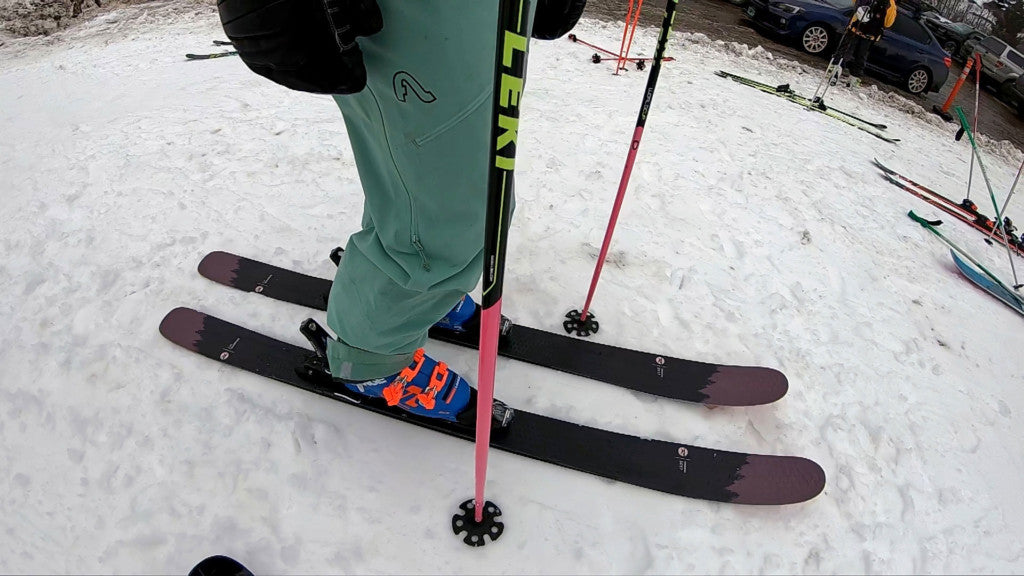How To Choose Skis
Ski Buying Guide
There is a lot of information on the web, in magazines, and from friends on how to choose the right skis, and of course, the correct length. We were there once, buying our first pair. It's a big investment, but the payback, if you choose correctly, is amazing; retail skis are superior to rental skis, only you have used them, so they will last a lot longer, and you can also gain valuable ski time on the mountain not having to get into the ski and boot rental queue.
Step 1 - Which Type Of Ski?
The first step is to work out the type of skier you are and the skier you want to be. Skis come in a variety of types. Here are the key ones:
Piste Skis - These are suited to skiing on piste, in good snow conditions. Some models use technology direct from the racing scene. Piste skis are great carvers. They may struggle a little when skiing in less perfect conditions, and also if you wish to go off-piste.
All Mountain Skis - These allow you to ski in a variety of snow conditions. So whether it is icy or slushy, an all-conditions ski will perform better than a piste ski. There is sometimes a loss of carving ability, but the modern all-conditions skis such as Volkl AC and Attiva women's skis have the latest technology to maintain carving ability.
Back Country Skis - These are for venturing out of bounds, hiking all over the mountain. They will remain versatile enough to ski the whole mountain, and also be lighter than normal to make it easier to carry them or travel uphill with them. Normally these are supplied without bindings, and you select an appropriate binding to suit your needs
Off-Piste Skis - These are designed for skiing in powder and off-piste conditions. They will generally be wider to help with floating in the snow, and be a little more forgiving to give you more feel in powder and to absorb impacts from jumping/landing.
Which Length Of Ski Do I need?
You know the type of ski you want. Now you just need to work out the correct length. To do so, any quality ski store will have a sizing guide to help you select your correct ski length. It is NOT just based on your height. The key factors are your WEIGHT and your ABILITY. Once this has been discussed the correct ski length can then be determined, and height is a final sanity check to make sure your ski is not too short or too long. As a general rule of thumb, a ski is on the short side if it is below the tip of your nose, is about right if at the tip of your nose, and a little too long if it is taller than you. But there are always exceptions so that is why we recommend using weight and ability first!
STEP ONE
Use your weight to determine your starting length:
|
Weight (kg) |
Men (cm) |
Women (cm) |
|
Under 49 |
140 |
135 |
|
50 – 56 |
145 |
140 |
|
57 – 62 |
150 |
145 |
|
63 – 68 |
155 |
148 |
|
69 – 75 |
160 |
152 |
|
76 – 81 |
165 |
156 |
|
82 and above |
170 |
163 |
STEP TWO
Next we match your ability and adjust the length accordingly, so firstly we give you an ability level of 1-10 (Please note run difficulties are based on the European piste grading system):
|
|
Ability level |
|
Never skied before |
1 |
|
You can stop with a snowplough |
2 |
|
Snowplough turns, doing the odd blue |
3 |
|
Starting to Parallel turn, onto blues |
4 |
|
Venturing onto reds, step turns sometimes |
5 |
|
Getting confident on reds, and the odd black |
6 |
|
Comfortable skiing most black runs |
7 |
|
Comfortable on ice, going off-piste |
8 |
|
Aggressive piste skiing, carving on all pistes |
9 |
|
Professional instructor or racer |
10 |
Now you know your level simply make the following change to the length we determined above:
|
Level |
Change |
|
1 -4 |
No |
|
5 -7 |
Add approximately 5cm |
|
8 – 10 |
Add approximately 10cm |
Remember this is a general guide, if you rented a size and felt it 100% worked for you then do not be afraid to stick with it, generally rentals handed out are a little on the short side, but length is a personal thing!

